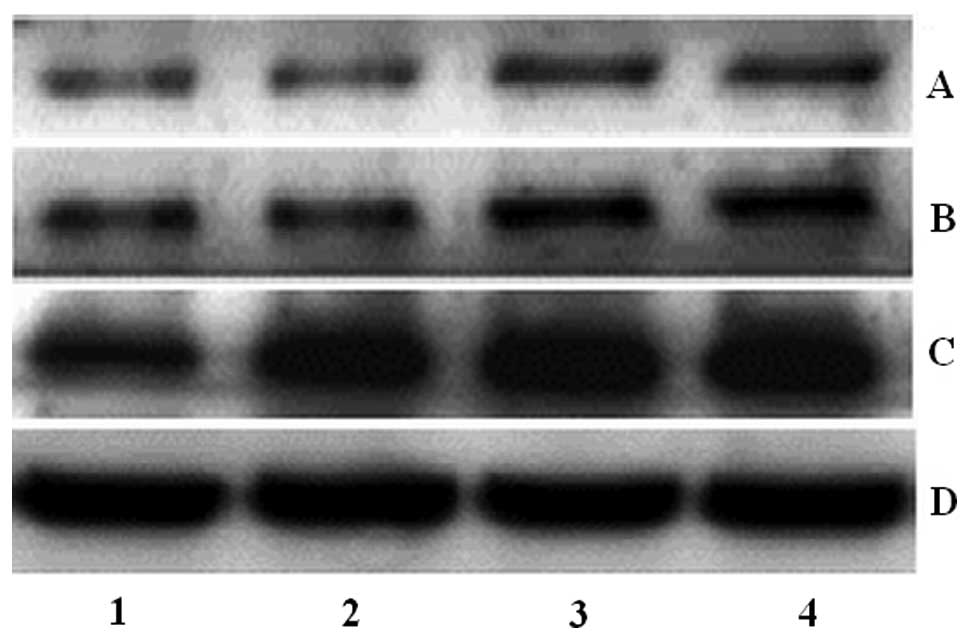|
1
|
Xu XW, Zeng GY, Yang Y and Liu HX:
Recombinant human brain natriuretic peptide on the cardiac
hemodynamics and renal function in dogs with heart failure. Yao Xue
Xue Bao. 37:758–762. 2002.(In Chinese).
|
|
2
|
Iglesias J, Hom D, Antoniotti M, Ayoub S
and Levine JS: Predictors of worsening renal function in adult
patients with congestive heart failure receiving recombinant human
B-type brain natriuretic peptide (nesiritide). Nephrol Dial
Transplant. 21:3458–3465. 2006. View Article : Google Scholar
|
|
3
|
Recombinant Human Brain Natriuretic
Peptide Multicenter Clinical Study Group. Hu DY: Efficacy and
safety of intravenous recombinant human brain natriuretic peptide
in patients with decompensated acute heart failure: a multicenter,
randomized, open label, controlled study. Zhonghua Xin Xue Guan
Bing Za Zhi. 39:305–308. 2011.(In Chinese).
|
|
4
|
Hatzistergos KE, Quevedo H, Oskouei BN, et
al: Bone marrow mesenchymal stem cells stimulate cardiac stem cell
proliferation and differentiation. Circ Res. 107:913–922. 2010.
View Article : Google Scholar : PubMed/NCBI
|
|
5
|
Wei H, Tan G, Manasi, et al: One-step
derivation of cardiomyocytes and mesenchymal stem cells from human
pluripotent stem cells. Stem Cell Res. 9:87–100. 2012. View Article : Google Scholar : PubMed/NCBI
|
|
6
|
Gnecchi M, Danieli P and Cervio E:
Mesenchymal stem cell therapy for heart disease. Vascul Pharmacol.
57:48–55. 2012. View Article : Google Scholar : PubMed/NCBI
|
|
7
|
Li XH, Fu YH, Lin QX, et al: Induced bone
marrow mesenchymal stem cells improve cardiac performance of
infarcted rat hearts. Mol Biol Rep. 39:1333–1342. 2012. View Article : Google Scholar : PubMed/NCBI
|
|
8
|
Vassalli G and Moccetti T: Cardiac repair
with allogeneic mesenchymal stem cells after myocardial infarction.
Swiss Med Wkly. 141:w132092011.PubMed/NCBI
|
|
9
|
Wen Z, Zheng S, Zhou C, Wang J and Wang T:
Repair mechanisms of bone marrow mesenchymal stem cells in
myocardial infarction. J Cell Mol Med. 15:1032–1043. 2011.
View Article : Google Scholar : PubMed/NCBI
|
|
10
|
Tokunaga M, Liu ML, Nagai T, et al:
Implantation of cardiac progenitor cells using self-assembling
peptide improves cardiac function after myocardial infarction. J
Mol Cell Cardiol. 49:972–983. 2010. View Article : Google Scholar : PubMed/NCBI
|
|
11
|
Hilfiker A, Kasper C, Hass R and Haverich
A: Mesenchymal stem cells and progenitor cells in connective tissue
engineering and regenerative medicine: is there a future for
transplantation? Langenbecks Arch Surg. 396:489–497. 2011.
View Article : Google Scholar : PubMed/NCBI
|
|
12
|
Menasche P: Cardiac cell therapy: lessons
from clinical trials. J Mol Cell Cardiol. 50:258–265. 2011.
View Article : Google Scholar : PubMed/NCBI
|
|
13
|
Siveski-Iliskovic N, Hill M, Chow DA and
Singal PK: Probucol protects against adriamycin cardiomyopathy
without interfering with its antitumor effect. Circulation.
91:10–15. 1995. View Article : Google Scholar : PubMed/NCBI
|
|
14
|
Oh Y, Wei H, Ma D, Sun X and Liew R:
Clinical applications of patient-specific induced pluripotent stem
cells in cardiovascular medicine. Heart. 98:443–449. 2012.
View Article : Google Scholar : PubMed/NCBI
|
|
15
|
Hoover-Plow J and Gong Y: Challenges for
heart disease stem cell therapy. Vasc Health Risk Manag. 8:99–113.
2012. View Article : Google Scholar : PubMed/NCBI
|
|
16
|
Arnous S, Mozid A, Martin J and Mathur A:
Bone marrow mononuclear cells and acute myocardial infarction. Stem
Cell Res Ther. 3:22012. View
Article : Google Scholar : PubMed/NCBI
|
|
17
|
Mills RM, LeJemtel TH, Horton DP, et al:
Sustained hemodynamic effects of an infusion of nesiritide (human
b-type natriuretic peptide) in heart failure: a randomized,
double-blind, placebo-controlled clinical trial. Natrecor Study
Group. J Am Coll Cardiol. 34:155–162. 1999. View Article : Google Scholar
|
|
18
|
Bocchi EA, Moura LZ, Issa VS, Cruz F,
Carvalho VO and Guimarães GV: Effects of the recombinant form of
the natural human B-type natriuretic peptide and levosimendan on
pulmonary hyperventilation and chemosensivity in heart failure.
Cardiovasc Ther. Aug 3–2011.(Epub ahead of print). View Article : Google Scholar
|
|
19
|
Iglesias J, Hom D, Antoniotti M, Ayoub S
and Levine JS: Predictors of worsening renal function in adult
patients with congestive heart failure receiving recombinant human
B-type brain natriuretic peptide (nesiritide). Nephrol Dial
Transplant. 21:3458–3465. 2006. View Article : Google Scholar
|
|
20
|
Calderone A, Thaik CM, Takahashi N, Chang
DL and Colucci WS: Nitric oxide, atrial natriuretic peptide, and
cyclic GMP inhibit the growth-promoting effects of norepinephrine
in cardiac myocytes and fibroblasts. J Clin Invest. 101:812–818.
1998. View Article : Google Scholar : PubMed/NCBI
|
|
21
|
Kawakami R, Saito Y, Kishimoto I, et al:
Overexpression of brain natriuretic peptide facilitates neutrophil
infiltration and cardiac matrix metalloproteinase-9 expression
after acute myocardial infarction. Circulation. 110:3306–3312.
2004. View Article : Google Scholar
|















